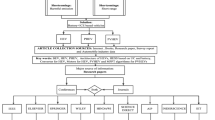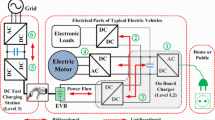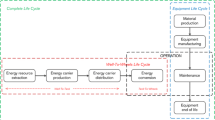Abstract
As increasing numbers of electric vehicles (EVs) enter into the society, the charging behavior of EVs has got lots of attention due to its economical difference within the electricity market. The charging cost for EVs generally differ from each other in choosing the charging time interval (hourly), since the hourly electricity prices are different in the market. In this paper, the problem is formulated into an optimal control one and solved by dynamic programming. Optimization aims to find the economically optimal charging solution for each vehicle. In this paper, a nonlinear battery model is characterized and presented, and a given future electricity prices is assumed and utilized. Simulation results indicate that daily charing cost is reduced by smart charing.




Similar content being viewed by others
References
Han S, Han S, Sezaki K (2010) Design of an optimal aggregator for vehicle-to-grid regulation service. Proc Innov Smart Grid Technol (ISGT) 19–21:1–8
Kempton W, Tomic J (2005) Vehicle-to-grid power fundamentals: calculating capacity and net revenue. J Power Sources 144(1):280–294
Han S, Han SH, Sezaki K (2010) Development of an optimal vehicle-to-grid aggregator for frequency regulation. IEEE Trans Smart Grid 1(1):65–72
AC Propulsion (2005) Development and evaluation of a plug-in hev with vehicle-to-grid power flow AC propulsion, CARB Grant Number ICAT 01-2, 2005
Tomic J, Kempton W (2007) Using fleets of electric-drive vehicles for grid support. J Power Source 168(2):459–468
Kempton W, Tomic J (2005) Vehicle-to-grid power implementation: from stabilizing the grid to supporting large-scale renewable energy. J Power Sources 144(1):280–294
Heydt G (1983) The impact of electric vehicle deployment on load management strategies. IEEE Trans Power Apparatus Syst, PAS-102 5:1253–1259
Clement-Nyns K, Haesen E, Driesen J (2010) The impact of charging plug-in hybrid electric vehicles on a residential distribution grid, IEEE Trans Power Syst 25(1): 371–380
Sundstroem O, Binding C (2010) Planning electric-drive vehicle charging under constrained grid conditions. In: International conference on power system technology, Hangzhou, China, pp 1–6
Rotering N, Ilic M (2011) Optimal charge control of plug-in hybrid electric vehicles in deregulated electricity markets. IEEE Trans Power Syst 26(3):1021–1029
You S, Traehold C, Poulsen B (2009) A market-based virtual power plant. In: Proceedings of the international conference clean electrical power (ICCEP) 460–465
Guzzella L, Sciarretta A (2007) Vehicle propulsion systems: introduction to modelling and optimization. ETH Zuerich, Switzerland
Bellman R (1957) Dynamic programming. Princeton University, Princeton
Bertsekas D (2007) Dynamic programming and optimal control. Athena Scientific, Nashua
Lafortune S, Wong E (1986) A state transition model for distributed query processing. ACM Trans Database Syst 11:294–322
Nissan battery documents, http://www.nissanusa.com/leaf-electric-car/tags/show/battery#/leaf-electric-car/tags/show/battery
Saft Batteries, High energy lithium-ion cell VL 45E cell, Jan 2010, [Online] http://www.saftbatteries.com
Kang Qi, Wang Lei, Wu Qidi (2009) Swarm-based approximate dynamic optimization process for discrete particle swarm optimization system. Int J Bioinspired Comput 1(1/2):61–70
Acknowledgments
This work was supported in part by the National Natural Science Foundation of China (grant no. 61005090, 61034004, 61075064, 61003053), the Program for New Century Excellent Talents in University of Ministry of Education of China (grant no. NECT-10-0633), the PhD Programs Foundation of Ministry of Education of China (grant no. 20100072110038), the International S&T Cooperation Program from Ministry of Science and Technology of China (grant no.2011DFG13020), the Shanxi Province Natural Science Foundation of China (grant no. 2011011012-1), and the Program for the Top Young Academic Leaders of Higher Learning Institutions of Shanxi.
Author information
Authors and Affiliations
Corresponding author
Rights and permissions
About this article
Cite this article
Lan, T., Hu, J., Kang, Q. et al. Optimal control of an electric vehicle’s charging schedule under electricity markets. Neural Comput & Applic 23, 1865–1872 (2013). https://doi.org/10.1007/s00521-012-1180-2
Received:
Accepted:
Published:
Issue Date:
DOI: https://doi.org/10.1007/s00521-012-1180-2




